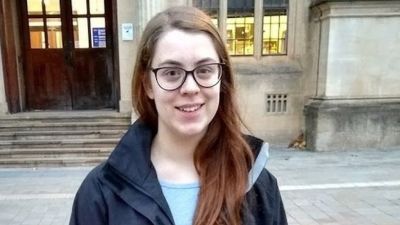Natasha Abrahart: University of Bristol contributed to death of student, court finds

Natasha Abrahart's parents, Robert and Margaret, call for action outside court.
The High Court has found the University of Bristol contributed to the death of a student who took her own life while suffering from a mental health condition.
Natasha Abrahart, originally from Nottinghamshire, was in her second year of an undergraduate physics degree at the University of Bristol when she ended her life on the day she was due to give a presentation.
On 14 February the judge rejected the University's appeal against an earlier judgment that found it had contributed to her death by discriminating against her.
Mr Justice Linden dismissed the University's case and found that the University had failed on all seven of its grounds of appeal.
The High Court heard how 20-year-old Natasha had social anxiety that amounted to a disability and was “very much under pressure” to attend oral assessments.
After the hearing, Natasha's parents, Robert and Margaret Abrahart, read a statement.
Robert Abrahart, a retired university lecturer, said: “It has been a long and painful journey to reach this point, and the University of Bristol has fought us every step of the way.
"The result is that we now have a judgment from the High Court confirming what we always knew to be true.
"The University of Bristol failed our daughter, broke the law, and contributed to her death.
"Their arguments that they did not know enough about Natasha’s problems, or that they hadn’t received the right paperwork, or that fairness to other students meant they couldn’t make the adjustments she needed, have now all failed for a second time.
"It is now for the University of Bristol, and higher education institutions across the country, to get their houses in order.”
Margaret Abrahart, a retired psychological wellbeing practitioner, said: “We have been able to get some measure of justice for Natasha because she was disabled and therefore covered by the Equality Act.
"But what about students who aren’t disabled? They need a statutory duty of care.
"128,000 people signed a petition calling for a statutory duty requiring universities to act with reasonable care and skill to avoid harming students, but the Government kicked the issue into the long grass.
"Do Keir Starmer, Rishi Sunak, and the other party leaders really think universities should be allowed to cause harm to their students by acting without reasonable care and skill? If they don’t, then they should prove it.
"Put a statutory duty of care for universities in your manifestos, or explain to the voters why you think that some students should be protected while others are not.”
Both parents have campaigned for universities to have a duty of care over their students.
Last year, they visited No.10 Downing Street to hand over a petition signed by nearly 130,000 people.
The #ForThe100 campaign refers to the "100 students who take their own lives every year" and calls on the government to make universities responsible for their students' welfare.
Following the High Court's ruling, the University of Bristol has issued a response.
Professor Evelyn Welch, Vice-Chancellor and President of the University of Bristol, said: “Natasha’s death is a tragedy - I am deeply sorry for the Abrahart family’s loss.
“At Bristol, we care profoundly for all our students and their mental health and wellbeing is a priority and is at the heart of everything we do. We continue to develop and improve our services and safeguards to support our students who need help.
“In appealing, we were seeking clarity for the Higher Education sector around the application of the Equality Act when staff do not know a student has a disability, or when it has yet to be diagnosed. We will work with colleagues across the sector as we consider the judgment.
“I am grateful to our dedicated colleagues who work tirelessly to support all our students and to those who specifically supported Natasha which included a referral to the NHS.
"Higher Education staff across the country share our deep concern about the increase of mental health issues amongst young people, and with that rise comes the increasing importance that staff, students, and their families are clear on what support universities can and should provide, and that students receive appropriate specialist care under the NHS should they need it.
“In 2022 Bristol became one of the first universities to receive the University Mental Health Charter Award, which recognises the continued hard work of our staff and students in terms of taking a strong, structured approach towards improving mental health and wellbeing across our university. We know there is always more to do, and we will keep working to achieve the best for everyone in our community.”
How to get help if you have been affected by the issues mentioned in this article:
CALM (Campaign Against Living Miserably) - Helpline: 0800 58 58 58
MIND provides advice and support to empower anyone experiencing a mental health problem. Information line: 0300 123 3393
Samaritans is an organisation offering confidential support for people experiencing feelings of distress or despair. Phone 116 123 (a free 24 hour helpline).
Shout is a 24/7 text service, free on all major mobile networks, for anyone struggling to cope and in need of immediate help. Text SHOUT to 85258.